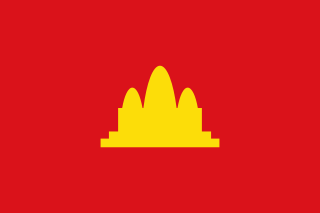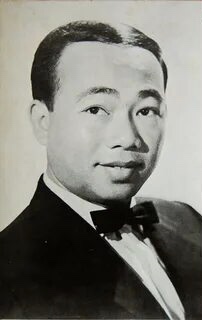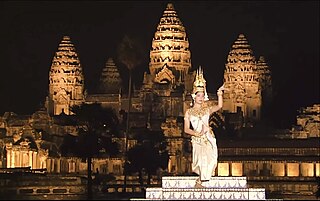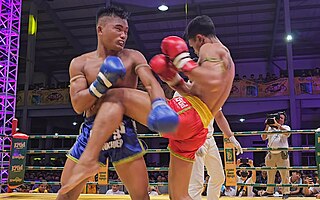Related Research Articles

The Khmer Rouge is the name that was popularly given to members of the Communist Party of Kampuchea (CPK) and by extension to the regime through which the CPK ruled Cambodia between 1975 and 1979. The name was coined in the 1960s by then Chief of State Norodom Sihanouk to describe his country's heterogeneous, communist-led dissidents, with whom he allied after the 1970 Cambodian coup d'état.

Sinn Sisamouth was a Cambodian singer-songwriter active from the 1950s to the 1970s. Widely considered the "King of Khmer Music", Sisamouth, along with Ros Serey Sothea, Pen Ran, Mao Sareth, and other Cambodian artists, was part of a thriving pop music scene in Phnom Penh that blended elements of Khmer traditional music with the sounds of rhythm and blues and rock and roll to develop a Cambodian rock sound. Sisamouth died during the Khmer Rouge regime under circumstances that are unclear.

Throughout Cambodia's long history, religion has been a major source of cultural inspiration. Over nearly two millennia, Cambodians have developed a unique Cambodian culture and belief system from the syncreticism of indigenous animistic beliefs and the Indian religions of Buddhism and Hinduism. Cambodia's achievements in art, architectures, music, and dance from the 9th and 14th century have had a great influence on many neighboring kingdoms, namely Thailand and Laos. The effect of Khmer culture can still be seen today in those countries, as they share many close characteristics with current-day Cambodia Many cultures are inspired by our neighbors, especially Thailand. As someone who once ruled the ancient Khmer The Tai borrowed from the Khmer many elements of Indianized culture, including royal ceremonies, customs followed at the court, and especially the Indian epic Ramayana, which influenced not only literature but also classical dance. Even in modern Thai culture the legacy of the Indianized culture of Angkor is still evident.

Kun Khmer, or Pradal Serey, The sport consists of stand up striking and clinch fighting, where the objective is to knock an opponent out, force a technical knockout, or win a match by points. The sport was codified in Cambodia by the French colonial administration in the early 20th century, and was derived from centuries-old traditions, namely Bokator, the close-quarter combat system used during the Khmer empire. The official Khmer name of the sport is Kbach Kun Pradal Khmer.

The Killing Fields is a 1984 British biographical drama film about the Khmer Rouge regime in Cambodia, which is based on the experiences of two journalists: Cambodian Dith Pran and American Sydney Schanberg. It was directed by Roland Joffé and produced by David Puttnam for his company Goldcrest Films. Sam Waterston stars as Schanberg, Haing S. Ngor as Pran, and John Malkovich as Al Rockoff. The adaptation for the screen was written by Bruce Robinson; the musical score was written by Mike Oldfield and orchestrated by David Bedford.

Cinema in Cambodia began in the 1950s, and many films were being screened in theaters throughout the country by the 1960s, which are regarded as the "golden age". After a near-disappearance during the Khmer Rouge regime, competition from video and television has meant that the Cambodian film industry is a small one.

Democratic Kampuchea was the Cambodian state from 1975 to 1979, under the totalitarian dictatorship of Pol Pot and the Communist Party of Kampuchea (CPK), commonly known as the Khmer Rouge. It was established following the Khmer Rouge's capture of the capital Phnom Penh, effectively ending the United States-backed Khmer Republic of Lon Nol. After Vietnam took Phnom Penh in 1979, it was disestablished in 1982 with the creation of the CGDK in its place.

Dy Saveth is a Cambodian actress and first Miss Cambodia (1959) often referred to as the "actress of tears". She is "one of the most beloved actresses from the 1960s era of Cambodian film".

The People's Republic of Kampuchea (PRK) was a partially recognised state in Southeast Asia which existed from 1979 to 1989. It was a satellite state of Vietnam, founded in Cambodia by the Vietnamese-backed Kampuchean United Front for National Salvation, a group of Cambodian communists who were dissatisfied with the Khmer Rouge due to its oppressive rule and defected from it after the overthrow of Democratic Kampuchea, Pol Pot's government. Brought about by an invasion from Vietnam, which routed the Khmer Rouge armies, it had Vietnam and the Soviet Union as its main allies.

Khmer Mekong Films (KMF) is a major Cambodian film and television production company based in Phnom Penh, the capital city of Cambodia. Founded by Matthew Robinson, a former director and executive producer of the BBC television series Byker Grove and EastEnders, KMF aims to help develop the Cambodian film industry, which was left moribund after the country was devastated by the Cambodian Civil War (1967–75), the Khmer Rouge regime (1975–79) and occupation by Vietnam (1979–89).

The Red Sense is a 2006 Khmer-Australian supernatural thriller film. It was director Tim Pek's debut film and was produced by Transparent Pictures. The success of The Red Sense led Transparent Pictures to produce films such as Bokator and Annoyed. The Red Sense was first released in Australia in August 2008, and though banned for general release there, screened in Cambodia in December that year. It is rated M by the Office of Film and Literature Classification of Australia.
Horror films in Cambodia, first popular in the 1970s, have received renewed attention in Cambodian film making since the resurgence of the local industry in 2003. Horror is one of three popular genres into which most Cambodian films can be loosely grouped, the other two being period pieces and melodrama/romantic drama. The fledgling Cambodian industry of the mid 2000s looked to capitalize on the world-wide popularity of Japanese horror films which have heavily influenced Cambodian horror films. Common themes are ghost or spirit hauntings, possession, folk mythology and revenge by supernatural means. The storytelling takes a slower pace than Western horror and relies on suspense, a pervasive sense of doom and dread, and psychologically disturbing events and situations. Unlike its Japanese counterparts however, many Cambodian horror films also feature over the top gore as seen in Western horror.
This is an incomplete, chronological list of films produced in the Khmer language in the 2000s.
Camerado is a commercial film, video and multimedia production group that produces independent, multicultural-themed films, videos, and media events with a prosocial agenda.

Davy Chou is a Cambodian-French filmmaker. He has written, directed and produced several films. Chou made his feature length debut with Diamond Island (2016) and made his follow-up with the film Return to Seoul (2022).

The Cambodian genocide was the systematic persecution and killing of Cambodian citizens by the Khmer Rouge under the leadership of Prime Minister of Democratic Kampuchea, Pol Pot. It resulted in the deaths of 1.5 to 2 million people from 1975 to 1979, nearly 25% of Cambodia's population in 1975.